Recent Posts
The Most Common Causes Of House Fires
1/31/2025 (Permalink)
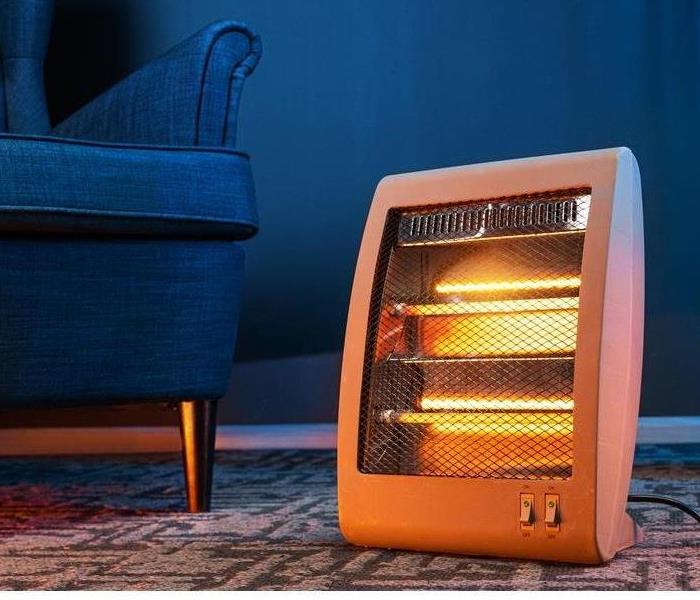 If your space heater isn't properly secured, it could lead to a fire! Contact our team to get out of a pickle!
If your space heater isn't properly secured, it could lead to a fire! Contact our team to get out of a pickle!
House fires can spread rapidly and leave untold property damage in their wake. What once was your safe space could turn into a blackened and charred mess! The best way to avoid this scenario is to be mindful of the most common causes. We'll give our insight below:
Space Heaters
As useful as space heaters are for warming up your space, they can cause significant damage if they come into contact with a flammable substance! Be mindful of where you place your heater, taking care to remove any flammable objects from the immediate area. Make sure you don't leave them unattended!
Candles
Candles are useful for their delicious smells, creating an inviting ambiance. However, one small slip up could set your whole room ablaze! Keep candles away from flammable objects. If you place them on an elevated surface, take care to ensure that it's nowhere near the edges.
Cooking Fires
It should go without saying that you should never leave your cooking unattended! Even the tiniest of mistakes can start a blaze, especially if you're using an oven or gas-powered stove top. Keep your cooking in your vision at all times!
Fire Damage Restoration With SERVPRO
SERVPRO of Morristown can respond 24/7 to fire damage concerns! We'll ensure that even the most devastating accidents are completely reversed. To make a fire accident appear as if it never happened at all, click here to contact our team and get started today!
Health Risks Of Untreated Water Damage
12/31/2024 (Permalink)
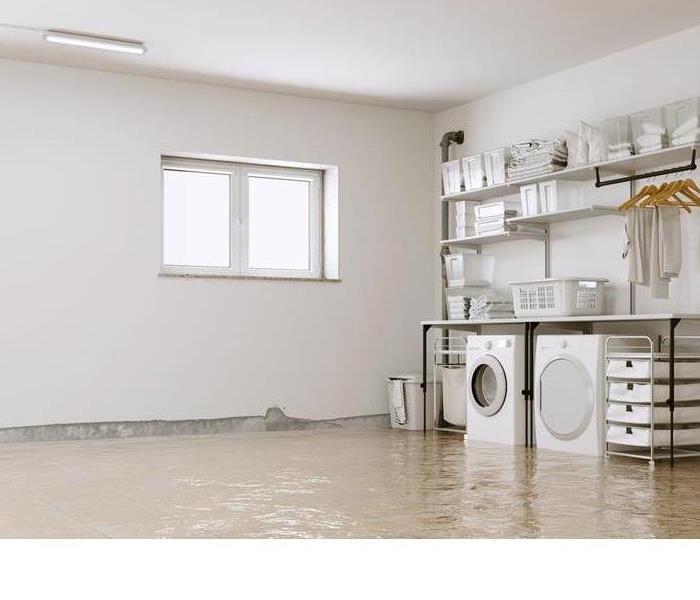 Flooding like this can cause serious problems - let us help you eliminate them!
Flooding like this can cause serious problems - let us help you eliminate them!
Water damage is often caused by flooding and plumbing leaks which diminishes the beauty of your home. However, its effect goes beyond its impact on your home's aesthetics. If left untreated, it can lead to significant health risks for you and your family.
This article outlines the health risks of untreated water damage.
Bacterial and Viral Infections
Stagnant water from untreated water damage often contains harmful bacteria and viruses. This leads to various gastrointestinal and skin infections such as diarrhea, vomiting, rashes, and boils.
Mold Growth
One common consequence of water damage is mold and mildew growth. The health effects of mold are hotly debated, but as one of the world’s most common allergens, it’s not something to trifle with.
Safety Hazards from Structural Decay
Water damage weakens the structural integrity of your home, causing it to fall apart. This leads to collapsed ceilings or walls that increase the risk of injury.
Pest-Related Illnesses
Stagnant water also attracts various pests, such as mosquitoes and cockroaches. These pests carry different types of diseases.
How to Address Water Damage
The best way to avoid all the above health risks is to address the water damage in your home. The best way to address this is to hire SERVPRO of Morristown for quick & efficient water damage restoration! We’ll be at your property at a moment’s notice with the right equipment to extract water and restore humidity levels. Contact us to restore your space to normal!
How To Prevent A Burst Pipe Incident
11/22/2024 (Permalink)
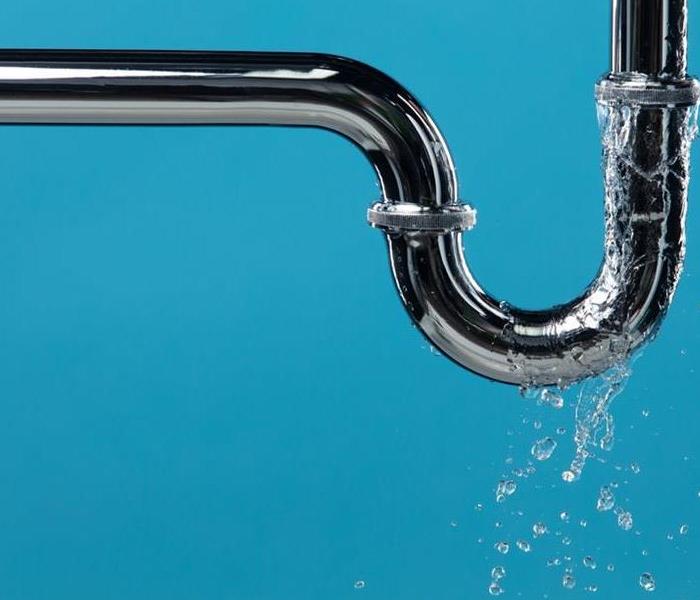 Don't let burst pipe incidents affect your property! If you notice the signs of water damage, SERVPRO can put a stop to the destruction for good.
Don't let burst pipe incidents affect your property! If you notice the signs of water damage, SERVPRO can put a stop to the destruction for good.
Burst pipes create a type of water damage that isn’t always noticeable at first. This could lead to the spread of water wreckage exponentially growing! The best way to avoid this is with preventative care for your plumbing pipes. Below, we’ll show you what you can do to prevent these incidents from forming!
Invest In Insulation
Your plumbing pipes run in a maze-like network around your home. Not every square inch of them will be within your heating system’s range, so its important to invest in pipe insulators for areas that don’t have them. The warmer your pipes are, the less likelihood they have of bursting and leaking.
Open Faucets During Cold Weather
This isn’t to say that your water should be running constantly during extreme cold. Instead, turn your tap on so the water slowly drips out. Moving water has a lower chance of freezing, so even the slightest of movements can help prevent burst pipes.
Open Kitchen Cabinets & Vanities
Your plumbing pipes will be more exposed to your heating systems if you keep your cabinets open. Since their closing decreases the amount of heat the interior receives, it can have a negative effect on your plumbing pipes. Opening them will ensure more heat gets to them.
Water Damage Restoration With SERVPRO®
SERVPRO of Morristown is available 24/7 to assist with water emergencies. We’ll ensure that your property & contents make a complete recovery! Give us a call if you’re experiencing a burst pipe issue!
Hidden Side Effects of Soot Damage
10/31/2024 (Permalink)
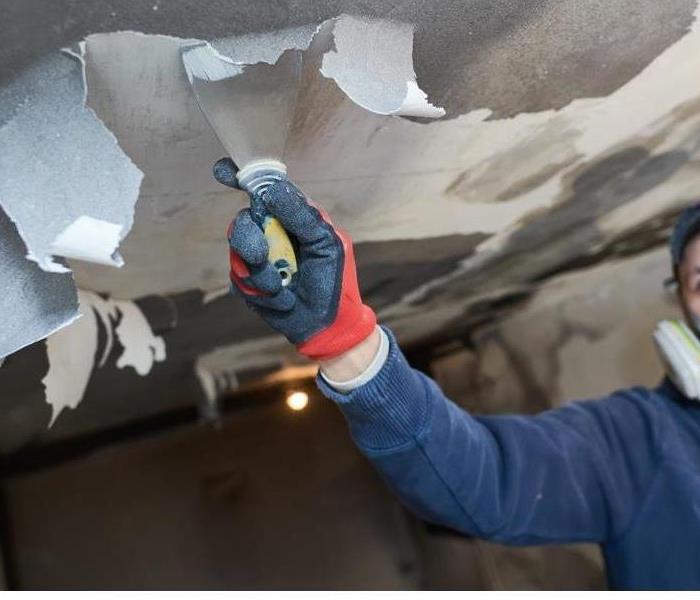 Our team eliminates soot and all of the odors and side effects that come with it!
Our team eliminates soot and all of the odors and side effects that come with it!
When your property suffers from a fire accident, soot is a byproduct that is unavoidable. Visually, it will render your property’s structure and belongings as a blackened mess. However, this visual change is only part of the problems that soot damage can cause. We’ll highlight the biggest side effects that soot causes below.
Foul Odors
Soot doesn’t just look bad; it smells bad too! The lingering effects of soot odor can last long after fire accidents, which is why odor removal is a crucial part of the restoration process.
Breathing Issues
You should be very careful and use the proper protective equipment when exposed to soot. As you breathe around it, tiny particles of soot enter your lungs, which can cause long-term breathing problems and aggravated asthma.
Carcinogen Exposure
Many carcinogens have been linked to an increased risk of cancer in humans, and soot contains many harmful carcinogens. The best way to avoid this is to wear proper equipment and let the professionals handle it.
Structural Damage
Soot isn’t just visually appalling! When it comes into contact with walls and structural elements, its corrosive properties can weaken these structures over time. Soot can severely damage a building’s structural integrity if not handled quickly.
Contact SERVPRO To Eliminate Soot
Proper response to fire damage incidents is crucial for restoring your property. SERVPRO of Morristown eliminates any byproducts of fire damage to ensure that restoration is a seamless process. Contact us for 24/7 response times!
What Causes Basement Flooding?
10/7/2024 (Permalink)
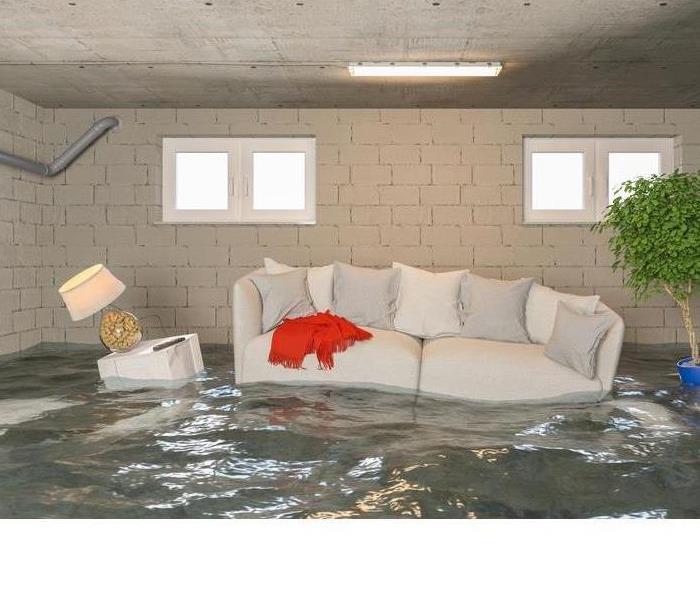 Don't let your basement get like this! If you've experienced a water disaster, our team can ensure that the destruction is completely undone!
Don't let your basement get like this! If you've experienced a water disaster, our team can ensure that the destruction is completely undone!
Basement flooding can cause untold water damage and property damage. You should be enacting preventative measures to prevent this visual and financial burden! We’ll give you our expert tips for preventing basement flooding by identifying its main causes.
Poor Yard Drainage
To check to see if you have poor yard drainage, go examine your lawn. If you notice a lot of puddles after a rainstorm, it could be a sign that it’s not draining properly! It’s one of the leading causes of basement flooding, as it can pile up and cause foundational cracks.
Sump Pump Failure
If your sump pump isn’t properly maintained, it can cause serious issues for your basement. Overworked sump pumps can burst and send sewage water seeping through your property.
Clogged Gutters
Enacting regular gutter maintenance prevents clogging issues. When gutter clogging happens, the excess water can seep into the soil around your yard and expose your basement to potential flood hazards.
Leaky Plumbing
Getting your plumbing inspected and maintained annually can help identify future problems - and prevent them entirely! Plumbing leaks can spread throughout a household, including a basement in a worst-case situation.
Water Extraction & Restoration With SERVPRO®
Basement flooding is a problem no property owner wants to experience. We’ll extract all of the water, remove humidity, and properly clean and sanitize your space to return it to its past condition. Give SERVPRO of Morristown a call for expert assistance with any water damage disaster!
How Partnering with SERVPRO of Morristown Helps You Restore and Rebuild After a Disaster
2/9/2024 (Permalink)
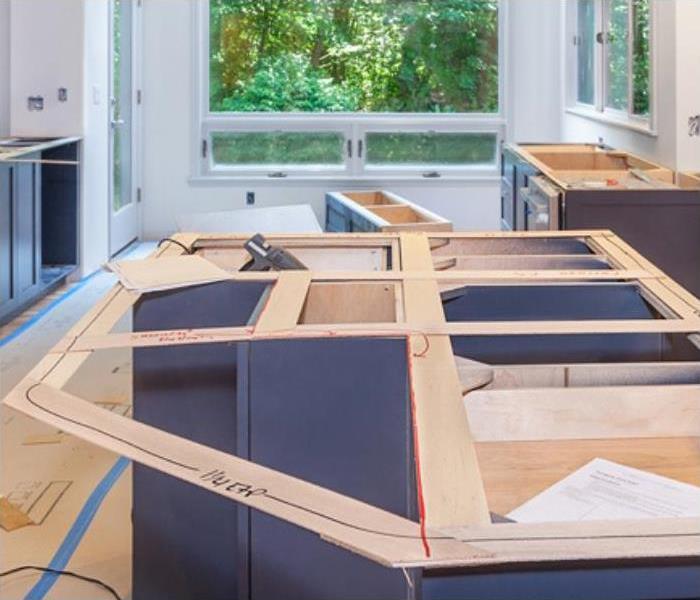 SERVPRO of Morristown specializes on Construction Services
SERVPRO of Morristown specializes on Construction Services
When disaster strikes, the path to recovery can seem daunting. That's where SERVPRO® of Morristown comes in, guiding you through the restoration and rebuilding process with expertise and compassion. Our all-encompassing approach ensures that from the moment disaster is assessed to the final touches of reconstruction, every step is handled with precision and care. This introduction sets the stage for understanding how SERVPRO's seamless integration of services not only restores your property but rebuilds your peace of mind.
Restoration and Clean-Up
At SERVPRO of Morristown, we understand the importance of a thorough and efficient cleanup process following any disaster. Our team is equipped to handle a wide range of cleaning needs, from water and fire damage to mold remediation and even biohazard situations. We utilize state-of-the-art techniques and equipment to ensure your property is cleaned, sanitized, and deodorized to meet the highest standards. This foundational step is crucial in mitigating further damage and setting the stage for the rebuilding phase, ensuring a smooth transition from restoration to reconstruction.
The Reconstruction Process
After cleanup, the reconstruction process is integral to our commitment to fully restoring your property post-disaster. This service encompasses everything from minor repairs to comprehensive rebuilding efforts, ensuring your premises are restored, making the damage "Like It Never Even Happened." The professionals at SERVPRO of Morristown are equipped to handle the reconstruction phase in full, helping alleviate the stress that comes with rebuilding after a disaster.
Why Choose SERVPRO?
When it comes to restoration after a disaster, SERVPRO of Morristown is your single point of contact when it comes to cleaning and reconstruction. By allowing SERVCPRO to be your advocate for reconstruction, you don't need to worry about managing multiple repair teams. SERVPRO of Morristown has you covered. On top of a single point of contact, SERVPRO also helps you in navigating the insurance claims process and assists in coordinating the necessary paperwork, giving you a quicker and easier experience.
Conclusion
SERVPRO of Morristown exemplifies resilience and expertise in the face of disaster, offering a comprehensive range of services from initial cleanup to complete reconstruction. With our approach and focus on quality, efficiency, and customer care, SERVPRO of Morristown not only restores properties but also peace of mind, making disasters "Like It Never Even Happened." This dedication to excellence and comprehensive support underscores why SERVPRO of Morristown is the preferred choice for disaster recovery and reconstruction. Contact us today!
Understanding Black Mold
1/23/2024 (Permalink)
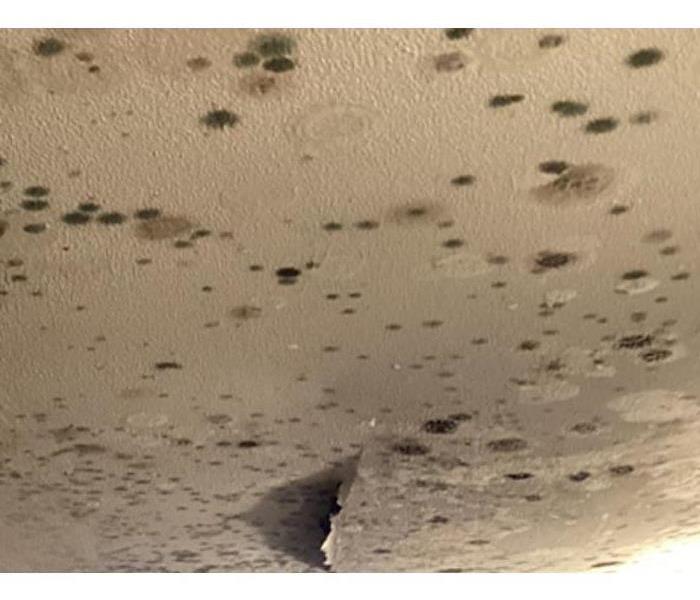 Black mold growing on ceiling, potentially compromising the integrity of the building
Black mold growing on ceiling, potentially compromising the integrity of the building
What is Black Mold, and Why is it a Concern?
Black mold, scientifically termed Stachybotrys chartarum, is a toxic mold variant that thrives in damp, humid conditions. Often characterized by its dark coloration, this mold is not just an aesthetic concern but poses significant health and structural risks. Its spores, when airborne, can exacerbate respiratory problems, allergies, and even lead to more severe health issues, particularly in those with compromised immune systems. Beyond health risks, black mold can also undermine the structural integrity of buildings, leading to costly repairs and devaluation of property. It is crucial for home and business owners to understand the gravity of black mold infestations and take proactive measures to mitigate its growth and spread.
Primary Causes of Black Mold Growth in Buildings
Understanding the root causes of black mold growth is essential for effective prevention and treatment. Primarily, black mold thrives in environments that provide moisture, organic material, and adequate temperatures.
- Moisture: The predominant factor for black mold growth is excess moisture, which can originate from several sources such as leaking pipes, roof leaks, condensation, or high indoor humidity. Buildings with poor drainage systems or those that have experienced flooding are particularly susceptible.
- Poor Ventilation: Inadequate ventilation in buildings leads to moisture accumulation, especially in high-humidity areas like bathrooms and kitchens. This lack of airflow not only supports mold growth but also prevents the drying out of damp areas, further exacerbating the problem.
- Building Materials: Black mold feeds on organic materials found in many building components like wood, drywall, and insulation. These materials, when exposed to moisture, provide the perfect breeding ground for mold.
- Temperature: Mold thrives in warm temperatures, typically found indoors. Buildings with inconsistent temperature regulation or poor insulation can have pockets of warmth that encourage mold growth.
Addressing these key factors is crucial in preventing and managing black mold in any building. By controlling moisture levels, ensuring proper ventilation, and using mold-resistant building materials, the risks associated with black mold can be significantly mitigated.
Identifying Early Signs of Black Mold
Early detection of black mold signs are crucial in preventing its spread and mitigating potential health risks. Being vigilant about the signs can help in taking timely action. Here are key indicators to watch for:
- Visible Growth: The most obvious sign is the appearance of dark, often black or greenish-black, splotches on surfaces, particularly in moist areas like bathrooms, kitchens, and basements.
- Musty Odors: A persistent musty, earthy smell is a strong indicator of mold presence, even if it's not immediately visible. This odor can be particularly noticeable in closed spaces or upon entering a room.
- Water Damage: Signs of water damage such as water stains, discoloration, or peeling wallpaper/paint can indicate potential mold growth areas, especially if the area remains damp.
- Health Symptoms: Unexplained allergic reactions like sneezing, sore eyes, nasal congestion, or skin irritation when at home may suggest mold presence. People with asthma or respiratory conditions may notice worsening symptoms.
- Humidity and Condensation: Excessive humidity and condensation on windows, pipes, or walls create ideal conditions for mold growth. Regular monitoring of these areas can help in early detection.
Regular inspections, particularly in prone areas, are essential in catching mold growth early. If any signs are detected, it’s advisable to seek professional assessment to determine the extent and necessary remediation steps.
Effective Strategies for Preventing Black Mold Growth
Preventing black mold growth is more manageable than dealing with its aftermath. Implementing effective strategies can significantly reduce the risk of mold infestation in any building. Here are some key preventive measures:
- Control Humidity Levels: Maintain indoor humidity levels between 30-50% using dehumidifiers and air conditioners. This range hinders mold growth.
- Enhance Ventilation: Increase airflow in high-moisture areas like bathrooms and kitchens by using exhaust fans and keeping windows open when possible.
- Immediate Water Damage Response: Address water leaks and spills promptly. The faster you dry the area, the lesser the chance for mold to grow.
- Regular Maintenance Checks: Perform routine inspections for leaks in roofs, pipes, and walls. Early detection and repair of these issues can prevent mold proliferation.
- Use Mold-Resistant Products: When building or renovating, consider using mold-resistant drywall, paints, and building materials, especially in moisture-prone areas.
- Keep Spaces Clean and Dry: Regular cleaning and vacuuming with HEPA filters can reduce mold spores in the home. Ensure that areas like bathrooms and basements are well-ventilated and dry.
- Proper Insulation: Ensure your home is properly insulated, including windows, doors, and pipes, to reduce the chances of condensation which can lead to mold growth.
Implementing these strategies creates an environment that is not conducive to mold growth, thus safeguarding the structural integrity of the building and the health of its occupants.
Conclusion
Combatting black mold effectively hinges on awareness and proactive prevention. Recognizing the early signs and understanding the causes is vital for maintaining a healthy environment in our homes and businesses. Simple measures like controlling humidity, ensuring good ventilation, and addressing water-related issues promptly can significantly deter mold growth. Regular maintenance and vigilance are key.
Need Expert Mold Remediation? Contact SERVPRO® Today
If you're facing mold challenges in your home or business, don't wait for the problem to escalate. SERVPRO of Morristown's professional mold remediation services are your solution. Our team of experts is equipped with the knowledge, tools, and experience to efficiently identify, address, and prevent mold issues, ensuring your environment is healthy and safe. Trust SERVPRO of Morristown to provide effective, thorough, and timely mold remediation services. Read more about our mold remediation services or give us a call today!
What the Polar Vortex Means for Your Pipes
1/15/2024 (Permalink)
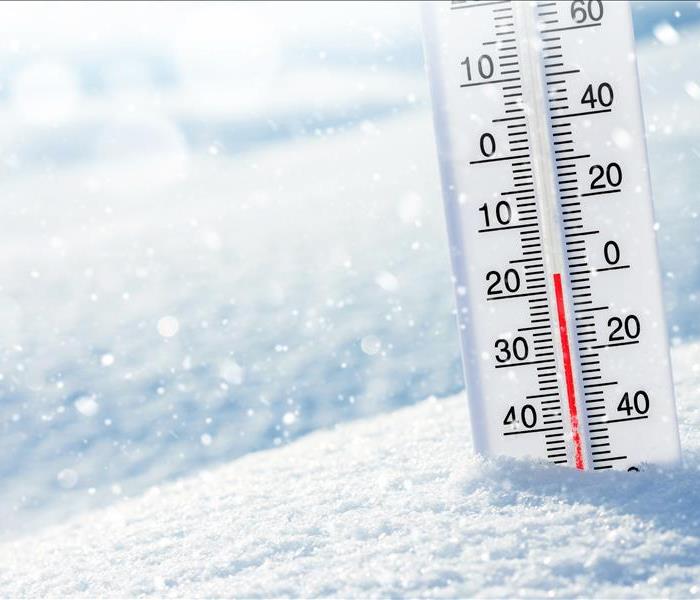 Polar Vortexes bring exceedingly cold temperatures
Polar Vortexes bring exceedingly cold temperatures
As the winter weather continues, "Polar Vortexes" become far more likely, signaling plummeting temperatures and severe weather conditions. This meteorological term, often associated with bone-chilling cold, can have a profound impact on daily life, particularly for homeowners and business owners. In addition to several drops in temperature to worry about, polar vortexes also heavily affect plumbing systems. As temperatures dive, the risk of pipes freezing and subsequently bursting increases, potentially leading to severely damaging water floods. Understanding the polar vortex, how it affects plumbing piping, and the necessary preventive measures are essential for bracing for the winter months. SERVPRO of Morristown has crafted some preventive measures you can utilize to ensure your plumbing stays safe during the ongoing polar vortex.
Understanding the Polar Vortex and Its Impact
A polar vortex is essentially a vast expanse of swirling cold air that typically envelopes the polar regions. However, during the winter, the vortex at the North Pole often expands, pushing frigid air toward the equator and affecting much of the Northern Hemisphere. This shift can result in a sudden and steep drop in temperatures, often catching businesses and residences off-guard.
The critical issue with these plummeting temperatures is their effect on water pipes. Water expands when it freezes, and this expansion can exert extraordinary pressure on pipes, regardless of whether they are made of metal or plastic. When the pressure becomes too great, pipes can burst, leading to water damage, the potential for mold growth, and the need for repairs on top of restoration and cleaning services.
Prevention and Protection
To mitigate the risks of a polar vortex freezing your pipes, consider the following preventive steps:
- Insulate Pipes: Wrapping exposed pipes in foam insulation, particularly those in unheated areas like basements, attics, and garages, can significantly reduce the risk of freezing.
- Maintain Consistent Indoor Temperature: Keeping your home heated consistently, even when you're away, helps keep the internal temperature of pipes above freezing.
- Allow Faucets to Drip: Allowing a slight drip in faucets can prevent pressure buildup within pipes, reducing the risk of freezing and bursting.
- Drain Water from Pools and Sprinklers: Drain water from the swimming pool and sprinkler supply lines following the manufacturer's instructions.
- Close Inside Valves Supplying Outdoor Hose Bibs: After removing and draining outdoor hoses, close the inside valves that supply these bibs but leave the outside valve open.
- Insulate Vulnerable Spaces: Increase insulation in areas like attics, basements, and crawl spaces to maintain higher temperatures.
- Open Cabinet Doors: Allow warmer air to circulate around plumbing by opening kitchen and bathroom cabinet doors.
The polar vortex, while a natural weather phenomenon, poses a significant challenge to plumbing, particularly regarding the risk of frozen and bursting pipes. By understanding this meteorological event and taking proactive, preventative measures, you can safeguard your home against the potentially devastating and costly consequences. Prevention actions are far more effective and less costly than repair. Stay warm, stay informed, and prepare your home for whatever the winter brings.
Should you incur any water or storm damage during the Polar Vortex, feel free to contact SERVPRO of Morristown, and we'll make it "Like It Never Even Happened!"
Basement Sewage Cleanup in Morristown, NJ
3/11/2023 (Permalink)
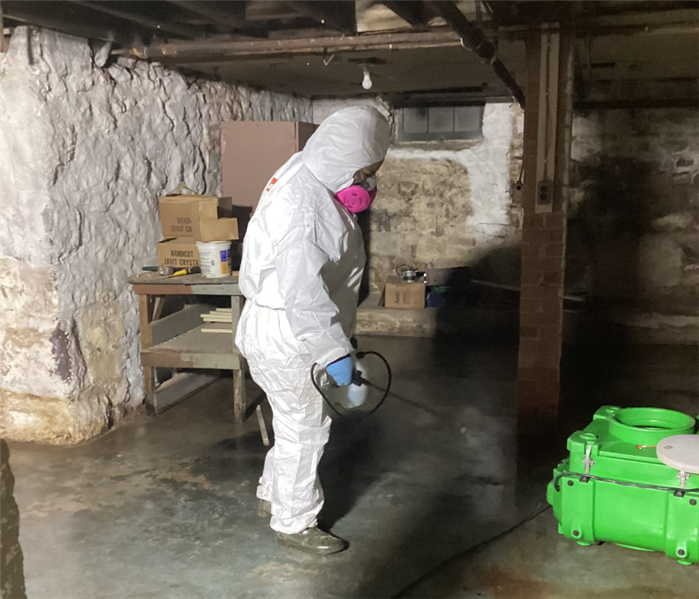 SERVPRO of Morristown provides emergency basement sewage cleanup in Morristown, NJ to quickly make your disaster "Like it never even happened."
SERVPRO of Morristown provides emergency basement sewage cleanup in Morristown, NJ to quickly make your disaster "Like it never even happened."
Since sewers typically back up through the lowest plumbing fixture in your home, you’re more likely to discover a sewage backup in your basement than any other area in your property.
A basement sewage backup in Morristown, NJ is a problem that no homeowner can afford to ignore. In addition to the water damage and bad odors it can cause, backups or toilet overflows also spread bacteria and viruses that can make you ill if handled improperly.
Here, we will outline the top causes for basement sewage backups to help you understand how to avoid them in the first place.
Need Sewage Backup Cleanup in Morristown, NJ? Call Us 24/7 - 800-734-3213
What Causes Sewage Backups?
1. Clogs in Drain Pipes or Main Sewer Line
A top cause of basement sewage backups is a blockage in your home’s drain pipes or in the city’s main sewer line.
When items like feminine hygiene products and diapers are flushed down the toilet, it can create clogs in the line that prevent wastewater from flowing through. Rinsing solid materials like coffee grounds, cooking oil, and hair down the drain can also clog your line.
2. Damage to Sewer Lines
If sewer lines become damaged or broken, wastewater is unable to flow through them and can instead build up in the line and cause a backup.
While any home’s sewer line can sustain damage due to normal aging and corrosion, most older homes have pipes made from cast iron and clay, which are more susceptible to cracking.
3. Tree Roots Growing into Pipes or Septic System
Trees may add beauty to your yard, but they can also wreak havoc on your septic system.
When tree roots grow near or around your pipes, they can weaken pipe walls and even grow through the pipes. If this happens, they can create a blockage that eventually leads to a backup.
4. Overflowing Septic Tank
When septic systems aren’t regularly pumped out, they can reach their maximum capacity.
If your home septic tank becomes flooded with too much water all at once, it can overflow, causing wastewater to flow back into your property.
5. Heavy Rains or Flooding
Since your municipal sewer system collects all of the runoff from your neighborhood, periods of heavy rain or flooding can cause your municipal system to reach its maximum capacity.
When the sewer tank becomes overfilled, excess water can be pushed back into your home and flood your basement.
Professional Basement Sewage Backup Cleanup in Morristown, NJ
Cleaning & Sanitizing Services
When sewage water backs up into your basement, the situation can be overwhelming. However, it’s crucial to seek emergency assistance from a sewage cleanup service that can quickly clean and sanitize your home.
As your local biohazard cleanup and water damage restoration company with over 15 years of experience in basement sewage cleanup in Morristown, NJ, you can trust our team to handle any size sewage disaster. Our team at SERVPRO of Morristown is highly trained with all of the equipment and resources needed to quickly restore your home to safe and sanitary conditions.
When you call SERVPRO of Morristown for expert basement sewage backup cleanup in Morristown, NJ, we’re ready to make the mess in your basement “Like it never even happened.”
Get 24/7 Basement Sewage Cleanup in Morristown, NJ - 800-734-3213
Furnace Leak Water Damage Cleanup in Morristown, NJ
3/6/2023 (Permalink)
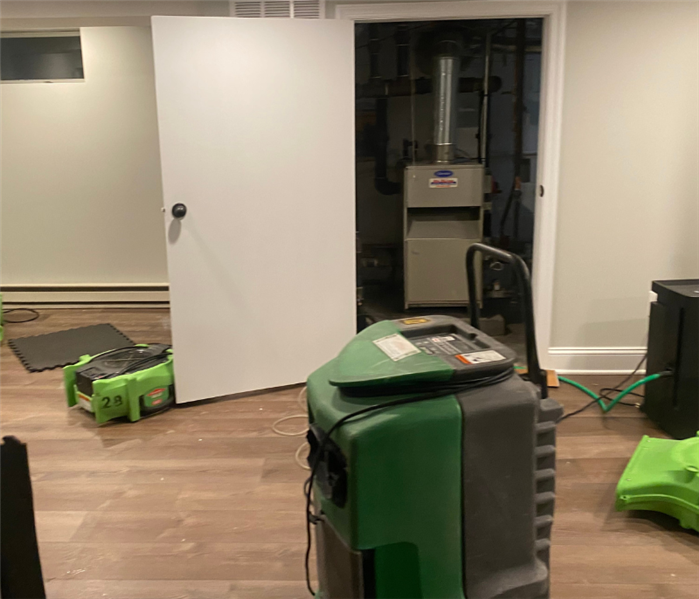 SERVPRO of Morristown provides expert & efficient furnace leak water damage restoration in Morristown, NJ.
SERVPRO of Morristown provides expert & efficient furnace leak water damage restoration in Morristown, NJ.
Finding a puddle of water around your furnace can be concerning, but leaks are a fairly common issue with furnaces.
There could be a number of reasons your furnace is leaking water in Morristown, NJ, but whatever the cause, you want to seek assistance to repair both your furnace and the water damage. When left unaddressed, leaks can leave behind water stains, mold growth, and may even cause serious damage to your home.
Here, we’ve described the most common causes of furnace leaks and what you should do when you discover a leak from your furnace in Morristown, NJ.
Call Today For Furnace Water Damage Restoration in Morristown, NJ - 800-734-3213
Why Is Your Furnace Leaking?
- Condensation leak. High-efficiency furnaces naturally produce condensation that runs through a condensate drain. If the condensation tubing or floor drain becomes blocked or clogged, the condensation could drain back to the furnace and leak out.
- Humidifier problems. Your furnace may have a built-in humidifier, which draws water from your home’s plumbing system to add it to the air. If the water lines break or crack, it can cause water to leak from the humidifier.
- Internal drain system clog. If your air conditioning is running and shares an internal drain with your furnace, a clog in the drain could cause water to be sent into your furnace.
- Faulty secondary heat exchanger. In a high-efficiency furnace, leftover combustion from the primary heat exchanger moves into the secondary heat exchanger, where more heat is released and, in turn, water vapor forms. If the water leaking from your furnace is due to a cracked or broken secondary heat exchanger, it must be replaced immediately.
What Should I Do If My Furnace Is Leaking Water in Morristown, NJ?
- Turn your furnace off immediately. You should turn off your furnace as soon as possible to prevent water damage or an electrical hazard. You can do this by turning off your thermostat or turning the furnace switch off, and then shutting the unit off at the breaker.
- Clean up the water. Now that your furnace’s electrical circuit is safely shut off, you can wipe up any puddles of water using a wet dry vacuum, towels, or a mop and bucket.
- Call an HVAC professional. An HVAC technician can help determine the cause of your furnace leak and complete the needed repairs or replacements.
- Seek help from an expert water damage restoration company. If the water was sitting for an extended period of time, you want to call a professional restoration company to address the water damage and possible mold growth from your furnace leak. SERVPRO of Morristown is Here to Help address any water damage or mold growth during furnace leak water damage cleanup in Morristown, NJ.
Professional Furnace Water Damage Restoration in Morristown, NJ
Complete Restoration Services
A furnace leaking water in Morristown, NJ may seem like a minor issue, but any size appliance leak can cause serious water damage, such as cracks in your foundation, musty odors, and even mold growth in as little as 48 hours.
As your local water damage restoration service with over 15 years of experience in furnace water damage restoration in Morristown, NJ, you can trust SERVPRO of Morristown to properly handle the damages from your furnace leak. Our IICRC Certified technicians provide rapid water removal services in Morristown and utilize specialized drying and moisture detection equipment to ensure your home is fully restored to its original condition.
When you call SERVPRO of Morristown for experienced furnace leak water damage cleanup in Morristown, NJ, we work hard to make your furnace leak “Like it never even happened.”
Get 24/7 Water Damage Repair After A Furnace Leak in Morristown, NJ - 800-734-3213
 If your space heater isn't properly secured, it could lead to a fire! Contact our team to get out of a pickle!
If your space heater isn't properly secured, it could lead to a fire! Contact our team to get out of a pickle!



 24/7 Emergency Service
24/7 Emergency Service








